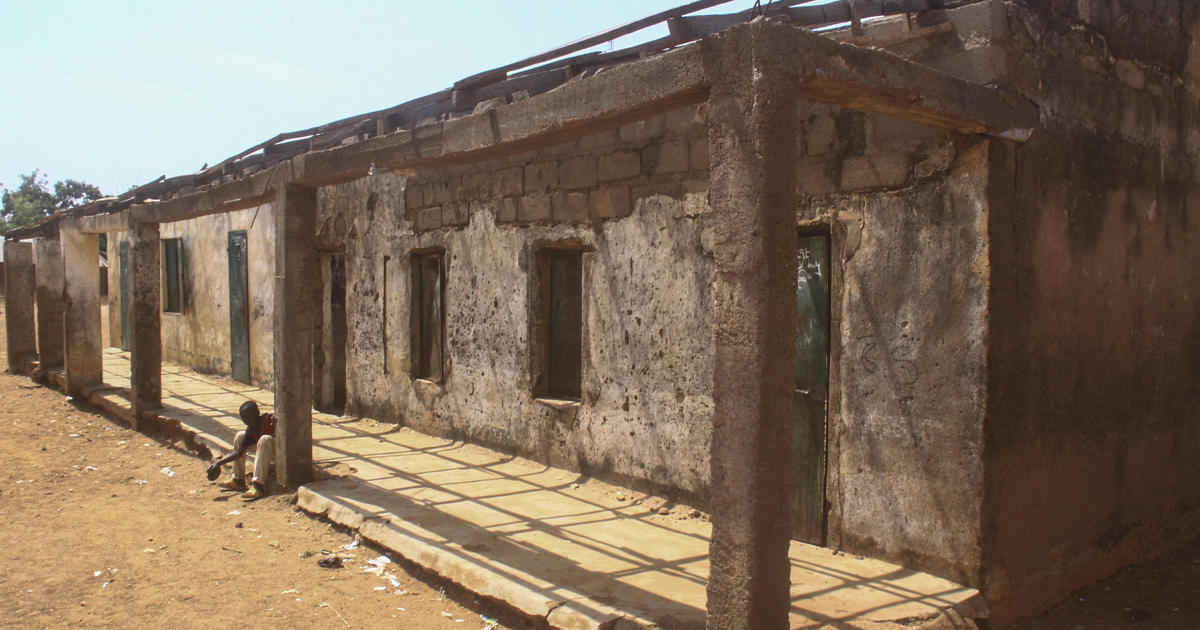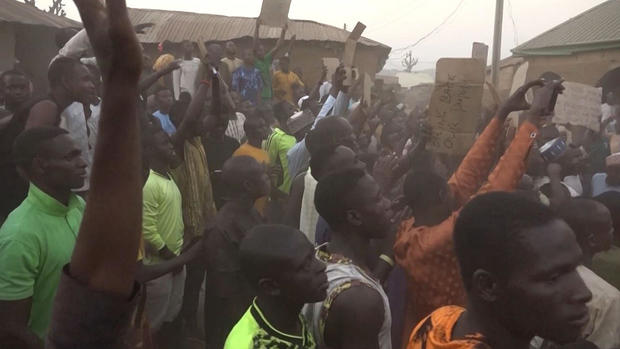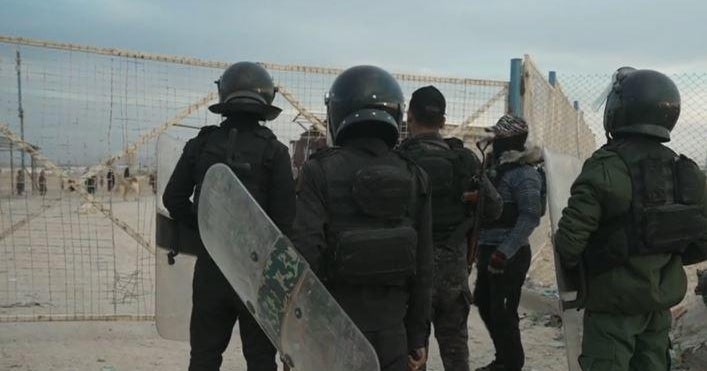CBS News
Mass kidnappings from Nigeria schools show “the state does not have control,” one expert says

Johannesburg — “In the past 10 years we have seen more than 17 mass kidnappings. It’s a bad record for any country and government, a total breakdown of the social contract,” regional security expert David Otto told CBS News over the weekend about the situation in Nigeria. “Most of the victims are women in these attacks, and when you attack women you have attacked society. The attacks of the last week — when 200-plus people are just taken — show after two decades of fighting insurgency, the government is still unable to protect society from terrorist groups.”
Otto spoke as the parents of more than 280 children voiced their anger over a mass abduction in Nigeria’s northern Kaduna state. The students, boys and girls between the ages of 8 and 15, were seized by armed men from the elementary and secondary schools in the town of Kuriga on Thursday.
AFPTV/AFP via Getty Images
The parents told local media outlets that bandits, as kidnap gangs in the region are commonly called, had taken their children and they implored Nigeria’s government to pay any ransom being demanded to secure their safe return.
Before the sun came up on Saturday, gunmen abducted another group of children from a school in Sokoto, a town in northwest Nigeria.
That was a smaller kidnapping, with about 15 children said to be missing, but it was the third incident reported in just a week, following reports that as many as 300 internally displaced people had gone missing near a camp in the northeast state of Borno.
Abducted, or just a “return to Boko Haram”?
On March 1, United Nations and local officials said close to 200 people, mainly young women, were abducted while collecting firewood outside a camp for displaced people near the town of Ngala, in Borno state. Many reports suggested it was a mass abduction carried out by the Islamic militant group Boko Haram, but in the days since the group vanished, that claim has been called into question.
In Borno state’s capital Maidaguri, Gov. Babagana Zulum, during a meeting with visiting European diplomats, vowed to ensure that his state would be free of terrorism and safe for displaced people. But he urged caution on the number of displaced people who went missing from the Ngala camp, saying the situation was not quite what had been initially reported.
Otto, a defense and counterterrorism expert who serves as the director of the Geneva Center for Africa Security and Strategic Studies, said multiple sources in the region had confirmed to him that what happened near the Ngala camp was actually a classic case of recidivism.
“The situation in the IDP camp is so dire, I am told, that a large number of women and some young men did not return to the camp and instead chose to return to the bush, to live with their husbands fighting for Boko Haram,” he told CBS News during a visit over the weekend to the Nigerian capital Abuja. “The whole kidnapping story is untrue, it was not a Boko Haram attack.”
Otto said the government didn’t want to admit that displaced people living in camps “are in a worse situation than they would be in the bushes, living off the land.”
Jane Hahn for the Washington Post
Nigeria’s relatively new President Bola Ahmed Tinubu, who campaigned on promises of restoring security across the country, released a statement Friday condemning the incidents in Borno and Kaduna.
“I have received briefings from security chiefs on the two incidents, and I am confident the victims will be rescued,” he said. “Nothing else is acceptable to me and waiting family members. Justice will be administered.”
He did not mention the most recent abduction, in Sokoto, which happened the day he spoke.
Shehu Sani, a former senator for the Kaduna area, told CBS News he was confident the children taken from the schools in Kuriga would be released soon.
Haidar Umar/AFP via Getty Images
“Knowing these are little children in a public school, the government will feel immense pressure and pay the ransom and get them out,” he predicted. He would not comment on whether any ransom demand had been made, and said the government would not disclose any negotiations.
“It’s very difficult to maneuver over 200 people, so my guess is the kidnappers will divide them up into smaller clusters to avoid airstrikes and then start negotiating quickly, as there is limited space for them to travel with so many people in the Kaduna area,” he said.
Omar Zaghloul/Anadolu via Getty Images
Mass abductions of schoolchildren have been a major security challenge across northern Nigeria for a decade, continuing despite promises of security in the wake of the highly publicized 2014 abduction of hundreds of girls from their school dormitory in Chibok, in Borno state. About 100 of those girls remain missing a decade later.
Kaduna state alone has had four large kidnapping attacks on schools in the last four years. Sani said terrorist groups target schools to use ransom payments as quick sources of cash to buy weapons or expand operations.
During a recent visit to the area, Gov. Zulum said he’d seen a number of women protesting their treatment at camps for displaced people and warning that if conditions in the camps didn’t improve, they would leave the camps.
“Ngala is one of the worst IDP camps in Borno, with over 70,000 households receiving minimal food assistance,” the governor said. “We must facilitate their access to livelihoods, otherwise there is a risk they will return to Boko Haram.”
Dr. Barkindo Mohammed Saidu, director-general of the Borno State Emergency Management Agency SEMA, said Sunday that nine of 102 displaced females who had vanished had since returned to the Ngala camp.
“We don’t believe they were abducted. We believe they only lost their way back home,” he said. “If they were abducted, there would have been a ransom demand, but no one has called.”
“These three recent incidents have shown the government cannot protect children at school, improve the lives of women at IDP camps, and ultimately that the state does not have control over the country’s security,” Otto said, adding that all of Nigeria had been “taken aback” by the recent events in the north.
CBS News partner network BBC News, along with many Nigerian outlets, reported Monday, meanwhile, that the country’s federal government had identified an unspecified number of schools in at least 14 different states and the capital Abuja as being vulnerable to attacks.
Hajia Halima Iliya, national coordinator of the state-run Financing Safe Schools in Nigeria program, said it had collected data to guide an intervention. The agency was formed after the 2014 abduction in Chibok.
CBS News
Gisèle Pelicot’s husband found guilty in mass rape trial in France

A judge in France on Thursday found the former husband of Gisèle Pelicot, who admitted to drugging and raping her repeatedly over the course of almost a decade and inviting dozens of other men to assault her as well, guilty of aggravated rape. Over the course of her trial, Pelicot — who insisted her full name be published and proceedings be made public — has been praised for her courage and become a symbol of the fight against sexual violence in France and around the world. The judge on Thursday was reading out verdicts for dozens of other men also accused of raping her.
Pelicot arrived Thursday at the court in Avignon, southeast France, where crowds had gathered outside holding signs saying: “Thank you for your courage.”
The trial began on Sept. 2, and almost every day, Pelicot came face to face with her former husband, Dominique, or one of the 49 other men charged with raping her. One other man faced a charge of aggravated sexual assault. She insisted that videos submitted as evidence, made by her ex-husband showing men sexually assaulting her while she appeared to be unconscious, be shown in open court.
The assaults took place between 2011 and 2020, when Dominique Pelicot was taken into custody. Police found thousands of photos and videos of the abuse on his computer drives, which helped lead them to other suspects. Some of the men testified they thought the unconscious woman was OK with it, or that her husband’s permission was enough.
“Gisèle Pelicot thinks that this shock wave is necessary, so that no one can say after this: ‘I didn’t know this was rape,'” her attorney, Stéphane Babonneau, told The Associated Press.
“It’s not for us to feel shame — it’s for them,” Pelicot said in court, referring to the attackers. “Above all, I’m expressing my will and determination to change this society.”
Controversial French laws
Pelicot’s case triggered protests across France, and there was hope among some demonstrators that the case could lead to changes in controversial French laws governing sexual consent.
France introduced a legal age of sexual consent in 2021 after a public outcry over the rape of an 11-year-old schoolgirl by a man who was initially convicted on a lesser charge. Since then, sex with anyone under the age of 15 has been viewed as non-consensual, but French law does not refer to consent in cases involving older victims.
Under French law, rape is defined as penetration or oral sex using “violence, coercion, threat or surprise,” without taking consent into account, according to the Reuters news agency. Prosecutors must, therefore, prove an intention to rape if they are to be successful in court, legal experts told Reuters.
Just 14% of rape accusations in France lead to formal investigations, according to a study by the Institute of Public Policies.
“Why don’t we manage to obtain convictions? The first reason is the law,” legal expert Catherine Le Magueresse told Reuters. “The law is written in such a way that victims must comply with the stereotype of a ‘good victim’ and a ‘true rape’: an unknown attacker, use of violence, and the victim’s resistance. But it is only true for a minority of rapes.”
“I’m trying to understand”
Speaking in court during the trial, Pelicot, who is 72, talked about how she had thought she was in a loving marriage with her husband and would never have guessed that he was drugging her.
“We would have a glass of white wine together. I never found anything strange about my potatoes,” Pelicot told the court.
“We finished eating. Often when it’s a football match on TV, I’d let him watch it alone. He brought my ice cream to my bed, where I was. My favorite flavor — raspberry — and I thought: ‘How lucky I am. He’s a love.'”
She said she didn’t have any sensation of being drugged.
“I never felt my heart flutter. I didn’t feel anything. I must have gone under very quickly. I would wake up with my pajamas on,” Pelicot told the court, adding that she would sometimes wake up “more tired than usual, but I walk a lot and thought it was that.”
“I’m trying to understand,” she said, “how this husband, who was the perfect man, could have got to this.”
CBS News
Teamsters going on strike against Amazon at several locations nationwide

The International Brotherhood of Teamsters says workers at seven Amazon facilities will begin a strike Thursday morning in an effort by the union to pressure the e-commerce giant for a labor agreement during a key shopping period.
The Teamsters say the workers, who authorized walkouts in the past few days, are joining the picket line after Amazon ignored a Dec. 15 deadline the union set for contract negotiations. Amazon says it doesn’t expect any impact on its operations during what the union calls the largest strike against the company in U.S. history.
The Teamsters say they represent nearly 10,000 workers at 10 Amazon facilities, a small portion of the 1.5 million people Amazon employs in its warehouses and corporate offices.
Amazon is ranked No. 2 on the Fortune 500 list of the nation’s largest companies.
At a warehouse in the New York City borough of Staten Island, thousands of workers who voted for the Amazon Labor Union in 2022 and have since affiliated with the Teamsters. At the other facilities, employees – including many delivery drivers – have unionized with them by demonstrating majority support but without holding government-administered elections.
The strikes happening Thursday are taking place at an Amazon warehouse in San Francisco and six delivery stations in southern California, New York City, Atlanta and the Chicago suburb of Skokie, Illinois, according to the union’s announcement. Amazon workers at the other facilities are “prepared to join” them, the union said.
“Amazon is pushing its workers closer to the picket line by failing to show them the respect they have earned,” Teamsters General President Sean M. O’Brien said in a statement.
“If your package is delayed during the holidays, you can blame Amazon’s insatiable greed. We gave Amazon a clear deadline to come to the table and do right by our members. They ignored it,” he said.
The Seattle-based online retailer has been seeking to re-do the election that led to the union victory at the warehouse on Staten Island, which the Teamsters now represent. In the process, the company has filed a lawsuit challenging the constitutionality of the National Labor Relations Board.
Meanwhile, Amazon says the delivery drivers, which the Teamsters have organized for more than a year, aren’t its employees. Under its business model, the drivers work for third-party businesses, called Delivery Service Partners, who drop off millions of packages to customers everyday.
“For more than a year now, the Teamsters have continued to intentionally mislead the public – claiming that they represent ‘thousands of Amazon employees and drivers’. They don’t, and this is another attempt to push a false narrative,” Amazon spokesperson Kelly Nantel said in a statement. “The truth is that the Teamsters have actively threatened, intimidated, and attempted to coerce Amazon employees and third-party drivers to join them, which is illegal and is the subject of multiple pending unfair labor practice charges against the union.“
The Teamsters have argued Amazon essentially controls everything the drivers do and should be classified as an employer.
Some U.S. labor regulators have sided with the union in filings made before the NLRB. In September, Amazon boosted pay for the drivers amid the growing pressure.
CBS News
Teamsters set to strike against Amazon at New York City warehouse

NEW YORK — The Teamsters union is launching a strike against Amazon at numerous locations across the country, including in Maspeth, Queens.
The Teamsters are calling it the largest strike against Amazon in United States history, and it’s set to begin at 6 a.m. Thursday. In addition to New York City, workers will be joining picket lines in Atlanta, Southern California, San Francisco and Illinois.
In a video announcement released Wednesday night, workers voiced their frustrations.
“Us being strike ready means we’re fed up, and Amazon is clearly ignoring us and we want to be heard,” one worker says in the video.
“It’s really exciting. We’re taking steps for ourselves to win better conditions, better benefits, better wages,” another worker in the video says.
The union says it represents about 10,000 Amazon employees and that Amazon ignored a deadline to come to the table and negotiate. The $2 trillion company doesn’t pay employees enough to make ends meet, the union asserts.
At the height of the holiday season, many are wondering what this means for packages currently in transit.
Teamsters President Sean O’Brien said, “If your package is delayed during the holidays, you can blame Amazon’s insatiable greed.”
Amazon says Teamsters are misleading the public
An Amazon spokesperson says the Teamsters are misleading the public and do not represent any Amazon employees, despite any claims.
“The truth is that the Teamsters have actively threatened, intimidated, and attempted to coerce Amazon employees and third-party drivers to join them, which is illegal and is the subject of multiple pending unfair labor practice charges against the union,” the spokesperson said in a statement.
An Amazon representative says the company doesn’t expect operations to be impacted.












